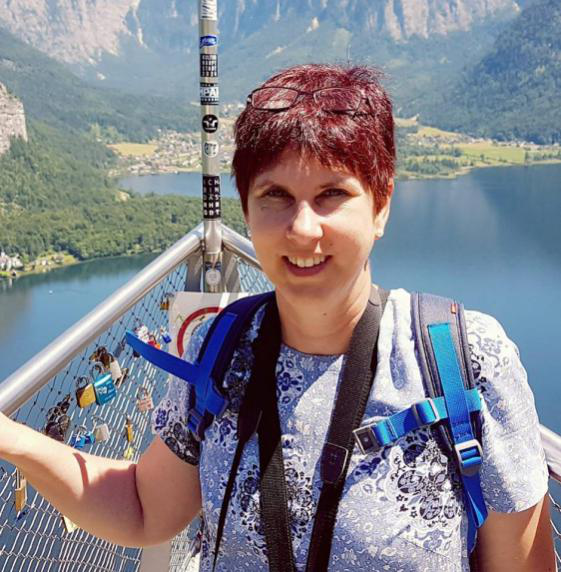The man in the funky racing suit with colored headband and sunglasses smiles. He is pleased by the squeals of delight from the tourists with him in the off-road desert vehicle. They love the adrenaline-pumping adventure of racing over the dunes of Inner Mongolia’s Kubuqi Desert.
Tserenbaabuu, who is the driver and owner of the vehicle, has a lot to smile about nowadays. Life in the desert is good for him and his family.
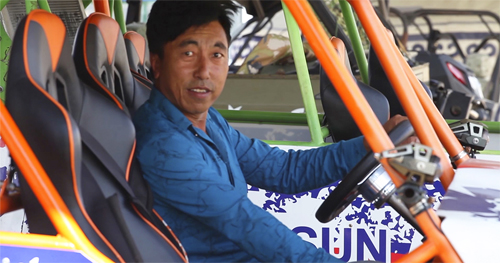
Tserenbaabuu, proud owner of off-road vehicles in the Kubuqi Desert.
It wasn’t always like this for Babu, as the 40-year-old entrepreneur is known at home. He knew a different side of the Kubuqi Desert while growing up — a harsh and unforgiving side where poverty was rife and modern amenities such as roads, electricity and running water didn’t exist.
Babu was born into a family of herdsmen who lived a primitive life scattered around oases in the desert. He ate and slept in a shabby shelter of less than 10 m² with his parents and two younger sisters. They depended on livestock and wild licorice for food and money. The nearest market was in Duguitala — a journey which took three days there and back.
“My mindset was very simple at that time, as was my daily life. I herded the animals in the morning, took a break at noon, and went back to herding in the afternoon,” is how Babu recalls his youth. He was obsessed with the off-road vehicles he occasionally saw in the desert, but could only dream about owning and driving one.
The Kubuqi Desert in the Inner Mongolia autonomous region is the seventh largest in China and covers an area of 18,600 km². Centuries of grazing had stripped the land of all vegetation, contributing to poverty and causing the sandstorms that sweep over Beijing, the capital of China.
The family had given up all hope of a better life when the ambitious Kubuqi greening project by Elion Resources Group reached them in 2006. It meant moving into a modern home in a newly built village with other herdsmen. Soon they also started to contribute to a desert ecological economy.
Elion partnered with local people and the local government to combat desertification as long ago as 1988. Thanks to Elion’s desertification control and afforestation efforts over the past 30 years, there is now an oasis of more than 6,000 km² in Kubuqi. This is where Babu now lives with his wife and two daughters.
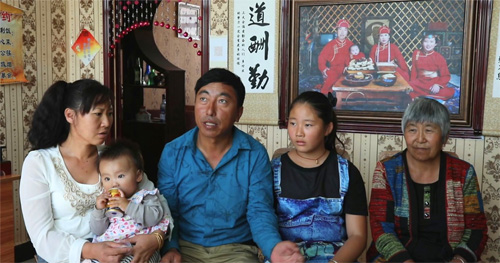
Babu and Yao Liyuan with his mom and two daughters.
The former herdsman met Yao Liyuan 15 years ago in Bayannur. They fell in love, married and settled near Lake Dadaotu in the middle of the desert. Yao Liyuan says she agreed to marry Babu and live with him in the desert because he is a “kind and honest man”.
The couple was over the moon when they moved into one of the 36 modern new homes built by Elion. They jumped at the opportunity to start their own business as part of the ecological relocation project. Their entrepreneurial skills kicked in when they started their own Mongolian restaurant in the village.
Not only locals but the ever-increasing number of tourists love the authentic Mongolian boiled lamb, milk tea and wine served by Yao Liyuan. During peak seasons, the couple makes up to 4,000 RMB per day in the restaurant.
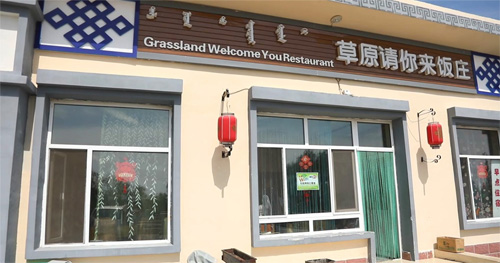
The Grassland Welcome You Restaurant which made it possible for the couple to earn a decent living.
Despite the restaurant’s success, Babu’s dream of owning an off-road vehicle was still alive. What’s more is that he could make it come true thanks to the boom in tourism in Kubuqi. He teamed up with two neighbors to start a business offering off-road drives over the dunes and to two lakes in the region.
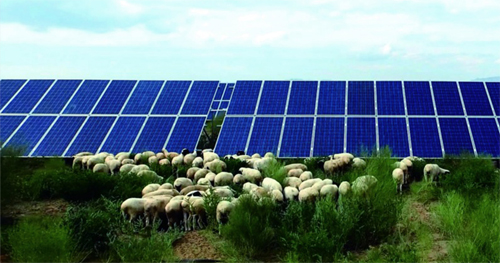
Evidence of desertification control and economic progress grazing sheep and a photovoltaic power plant.
Babu and his business partners now own 16 off-road desert vehicles. Each has a special name such as Big Wave, Farmer and Great Shatuo. The debt they made to start the business was paid off after two years. While making a profit for themselves, they are also improving the lives of the 10 professional drivers in their employ.
The annual income of local herdsmen has increased to over 30,000 RMB from only a few hundred RMB more than ten years ago. The Kubuqi model is based on a public-private-people partnership. More than 500 billion RMB of ecological wealth has been created, and 102,000 people lifted out of poverty since 1988.
It is fair to say Elion managed to harness the economic potential of the desert while at the same time balancing environmental and developmental sustainability. The scheme won the company the 2013 Global Dryland Champion Award — a prize by the UN Convention to Combat Desertification (UNCCD).
The recent 13th Session of the Conference of the Parties (COP 13) to the UNCCD was aptly held in Ordos in the Inner Mongolia autonomous region of China in September 2017. Delegates to the conference agreed that the Kubuqi desertification prevention model reflects the Chinese government’s emphasis on environmental governance and sandstorm control. A total of 112 countries pledged to set voluntary targets to achieve “Land Degradation Neutrality” by 2030.
Erik Solheim, deputy secretary-general of the UN and executive director of the UN Environment Program (UNEP), said global anti-desertification efforts require concerted action and could benefit from China’s rich experience and expertise.
Solheim visited the Kubuqi Desert earlier in 2017. He was impressed by the evident achievements in greening, saying China’s experience in combating desertification should be replicated by the world.
The Kubuqi Desert, which used to be called the “Sea of Death”, is now green, while the inhabitants are more prosperous, relying on desert tourism, afforestation, photovoltaic power generation, farming and licorice production.
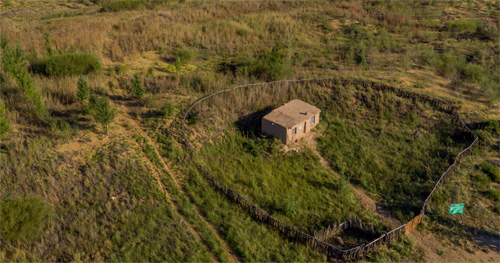
The house where Babu grew up is now surrounded by an oasis.
Not far from Ordos where the leading experts on desertification control gathered, Babu’s days are still as long as when he was a herdsman. The only difference is that he is now happily busy doing what he loves and earning a decent living. After managing his business and driving tourists around all day long, he finds time to help Yao Liyuan in the restaurant — washing dishes, chopping meat and vegetables, even cooking.
“I work very hard all year long to earn more and to create a better life for my wife and two daughters. I want to provide a good life for them and to help them receive a good education. I hope they study hard and maybe live in a big city one day.”
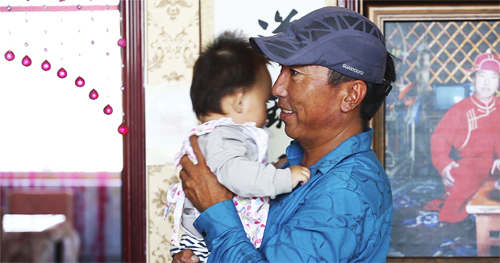
Father-and-daughter moment for Babu and his youngest.
For now, life is good enough to allow for fun in between all the hard work. Like going horse riding with Mengsha, his oldest daughter. Her echoing laughter as she prods her horse into a gallop is music to her father’s ears.
Yes, life in the desert is finally good again for Babu and many other former herdsmen like him.


